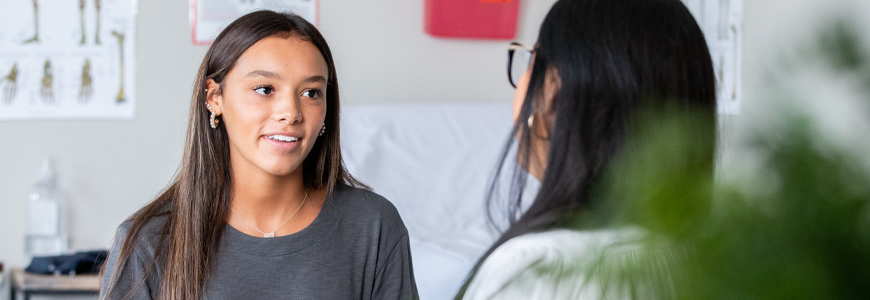When a 16-year-old female patient presented to John L. Lyles, MD, a pediatric gastroenterologist, with difficulty swallowing certain foods and a family history of eosinophilic esophagitis (EoE), Lyles suspected she may also have the condition. The patient’s father and grandfather both have confirmed diagnoses of EoE.
“She presented with the feeling that certain solid foods would not go all the way down, causing her to regurgitate gastric contents to relieve the obstruction. This was happening as frequently as weekly, and consistently for several months,” explains Lyles.
As a next step, the patient would need an endoscopy and biopsies to confirm the diagnosis.
What innovative diagnostic option did Dr. Lyles offer to the patient and her family?
Through a consultation with the patient and her family, Lyles determined the patient was a good candidate for sedation-free transnasal endoscopy (TNE). Duke Children’s is the first center in North Carolina, South Carolina, Georgia, and Virginia to offer TNE for pediatric patients using the EvoEndo® Model LE Gastroscope (EvoEndo, Inc., Centennial, CO). The system allows Lyles to visualize and biopsy the upper digestive tract without general anesthesia.
For young patients, TNE is beneficial because they can return to normal activities the same day of the procedure, compared to traditional endoscopy under anesthesia, which involves a longer stay in the hospital and recovery at home.
“This patient was an ideal candidate for TNE; she had a good grasp of her symptoms. We described the procedure, and she was open to it,” says Lyles. “We were able to complete her TNE procedure within two weeks of her initial consultation.”
The patient tolerated the TNE procedure well with only mild discomfort. “She was in and out of the procedure unit in about one hour, which is one-third of the time compared to an endoscopy under sedation,” says Lyles.
The image and biopsy results confirmed what Lyles and the patient suspected — EoE. Lyles followed up with the patient and her family via a telemedicine appointment to review results and discuss a treatment plan. “We started the patient on a proton pump inhibitor twice a day, and decided to repeat the TNE in two months to check her response,” he says.
The patient returned for her second TNE procedure and tolerated it very well again. Results showed improvements in her esophageal tissues. Her biopsies came back normal with significant healing, and she reported improvements in swallowing and fewer obstructions. Lyles and her family agreed to continue medication therapy and check progress with a follow-up appointment in a few months.
Lyles says, “While we had a strong suspicion of EoE, this is a great example of achieving positive outcomes without needing an initial endoscopy under anesthesia. TNE can be considered a screening tool for certain GI symptoms in pediatric patients. While we might not always come out with a complete diagnosis following the procedure, it can more quickly eliminate some possibilities and guide our approach.”
To refer a patient to Duke Children’s pediatric gastroenterology, call 919-635-4229.
